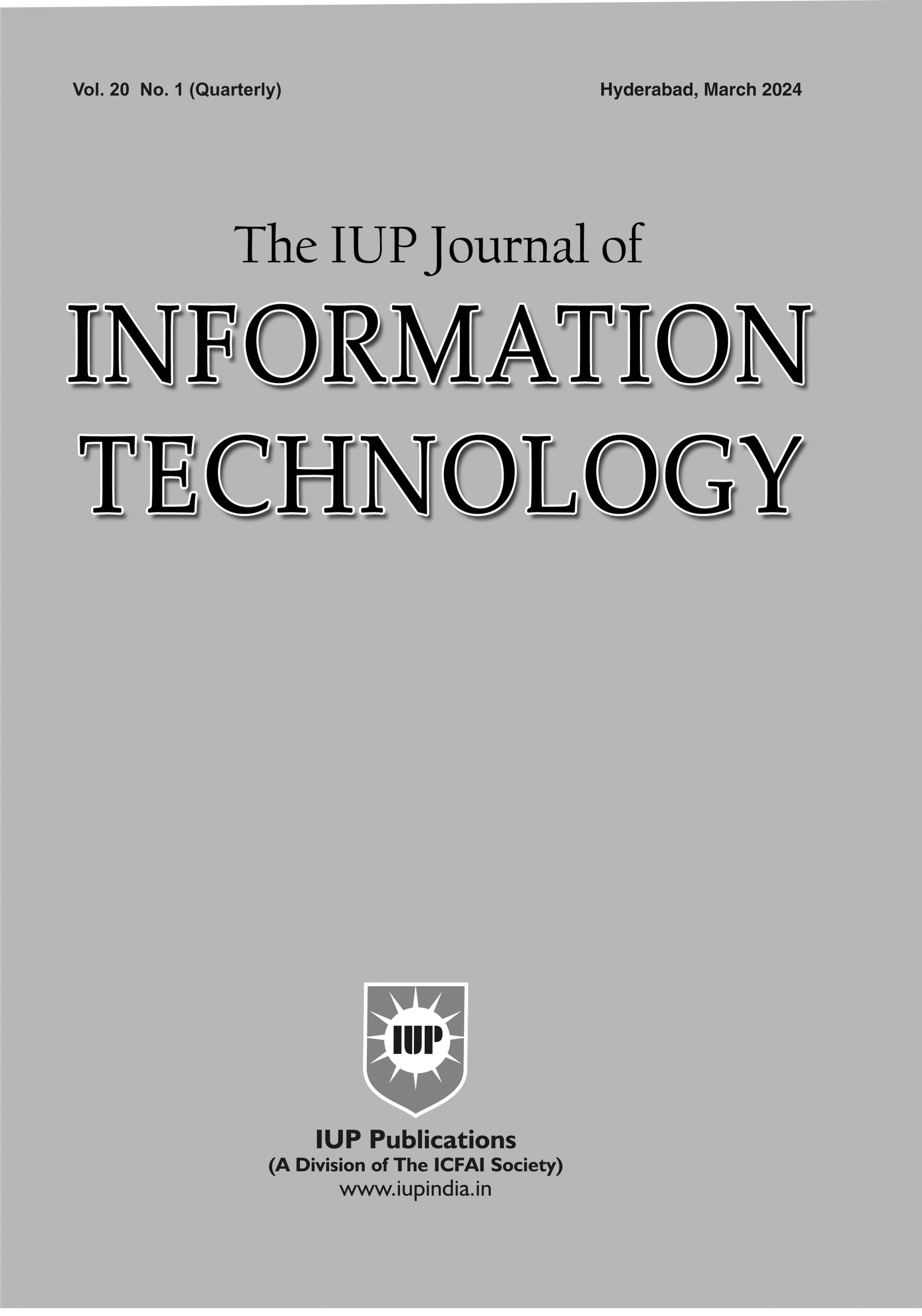
Jun'19
The IUP Journal of Information Technology
Focus
Cloud computing is a rapidly developing area which stores ample promises for
computer and information technology industry. Its emergence has made
tremendous impact on the industry over the past few years. Cloud computing combines an array of existing developments such as parallel computing, distributed computing, grid computing and virtualization technologies, to name a few. Based on the idea of utility computing, it offers the convenience of pay-per-use and on-demand computing of shared IT resources to the users. Cloud computing services primarily operate on models such as SaaS (Software as a Service), PaaS (Platform as a Service) and IaaS (Infrastructure as a Service) in order to drastically reduce the cost of computing and total cost of ownership. Computing services are deployed using private cloud, public cloud or hybrid cloud, which depends on several factors like budget, nature of data, security, etc.
This emerging form of computing has created new business entities such as cloud providers, cloud service brokers and cloud resellers to deliver computing services to the consumers. It has found fertile grounds and attracted investments in many
industries like banking, healthcare, education, etc. Adoption of cloud computing is growing. According to IDC�s (International Data Corporation) worldwide
report, 70% of organizations have at least one of their applications deployed using cloud computing. It is expected that spending on cloud services will be more than $210 bn by 2020.
As cloud computing becomes popular, it will continue to throw challenges such as security, reliability, scalability, sustainability, heterogeneity and data management, among others. Although there have been systematic attempts to address many
challenges, there remains several issues open for future research. As cloud computing matures over the years, it will impact significantly on several other emerging trends such as Container Technologies, Fog Computing, Big Data, Internet of Things, Serverless Computing, Software-Defined Cloud Computing, Blockchain, Machine and Deep Learning Services, etc.
The first paper, �Migration to Cloud: The Strategic Issues�, by Jitendra Singh, identifies several issues that need to be considered while adopting cloud computing by any organization in order to avoid any bumping. In particular, organizations with legacy systems should be more careful to examine quite a few factors related to migration to harness the benefits of cloud computing.
The second paper, �A Competence-Based Recruitment System Using Mean Deviation�, by Bridget Chinalu Ujah-Ogbuagu, presents a web-based system to verify the competency level of candidates in a recruitment process. Following a three-phase verification process, the system ensures that the recommended candidates are better qualified and competent for a job.
The last paper, �A Study of ICT Competence Among Nigerian Academic Staff in Monotechnics�, by Aisha Awal, Amit Mishra, Elijah Joseph and Jamilu Mai Pan Uku, attempts to find ICT usage habits and competencies among the staff of various
teaching institutions in Nigeria. The study finds dismal statistics and reveals worrisome facts.
Consulting Editor
Migration to Cloud: The Strategic Issues
Cloud computing has emerged as a single solution for a variety of business needs. To newly budding startups and existing businesses, for IT solution, if anything that strikes them, it is cloud computing. Migrating to cloud is a sensitive issue. This work has identified several strategic issues that need to be taken into account to avoid any bumping in cloud adoption. It will immensely assist in mitigating the risk for the business organization, particularly those aiming at migrating to cloud computing in order to drive the business benefits. The newly introduced privacy act General Data Privacy Regulation (GDPR) of European Union (EU) is also taken into account to understand its impact on cloud computing, particularly in EU. Issues have been tailored in order to ensure that it caters to the emerging and dynamic demand of subscribers.
A Competence-Based Recruitment System Using Mean Deviation
The backbone of every establishment or institution is the quality of its staff. The success of establishments depends to a large extent on the caliber of their staff. Many establishments have suffered the effect of recruiting staff members who are certificate qualified but not competent in the job. It is therefore very important for establishments to make sure that applicants are thoroughly screened to ensure that they are both certificate qualified and competent for the job they are applying. The paper uses a 3-phase verification procedure to ensure that applicants who are recommended for interview for a job are qualified and competent. The 3-phase approach uses mean deviation to check the dispersion between Performance on Curriculum Vitae Test (PCVT) score and Computer Aptitude Test (CAT) score for each applicant. If the dispersion is considered to be too wide, the applicant is disqualified. Also, if an applicant�s mean score is less than the entire population mean score, the applicant is disqualified. A website is developed as a platform for the 3-phase verification procedure. MySQL, Ajax, Java, PHP and HTML web tools were employed in the development of the competence-based recruitment system and its interface.
A Study of ICT Competence Among Nigerian Academic Staff in Monotechnics
Today�s fast-paced world is becoming increasingly characterized by technology-driven communication, which has transformed the world into a large globally connected community with ever-increasing outreach of Information and Communication Technology (ICT). Technology plays an increasingly important role in people�s lives, and it is envisaged that technological literacy will soon become a functional requirement for people�s work, social and even personal lives. For both social and economic reasons, staff will need computer and communication technology skills if they are to live successfully in a knowledge-based society. The paper examines the ICT usage habits and the self-assessed ICT competencies possessed by staff of monotechnics and polytechnics. A second important issue that was addressed was whether there were significant differences in the perceived ICT competency among staff according to the demographic and study-related factors.